Unit One This Is My Day
基本词汇:
Activities(活动) |
Time(时间) |
频率词 |
get up 起床 do morning exercises 晨练 have English class 上英语课 play sports 进行体育活动 play the piano 弹钢琴 climb mountains 爬山 go shopping 购物 go hiking 去远足 visit grandparents 看望外/祖父母 eat breakfast 吃早饭 eat dinner 吃晚饭 |
morning 早上 in theafternoon 下午 evening 晚上 noon 中午 at night 夜晚 6:00 具体时间 onSunday 在星期天 when 什么时候 |
always 总是 usually 通常 often 经常 sometimes 有时 seldom 很少 never 从不 (频率程度依次减低) |
基本句型:
1. 询问生活规律:
---- When do you ……?你什么时候……?
---- I usually… at … Sometimes I….我通常在…(点钟)…(做什么事)。有时…
E.g. --- When do you go to school ? 你每天几点去上学?
--- I usually go to school at 7:00. Sometimes I go to school at 7:10.
2. 询问生活习惯:
--- What do you do on the weekend? 你周末做什么?
--- I usually / often ….. Sometimes I …..
E.g. --- What do you do on the week?
--- I often play football. Sometimes I go shopping with my mom.
3. 介绍自己的生活习惯:
Every weekend I go hiking. 我每个周末远足。
Every day I do my homework at 8:00 in the evening. 我每天晚上8点做作业。
4. 询问职业:
--- What do you do? 你是干什么的?
--- I am a doctor / nurse / policeman….
5. Thank you for tellingme about your day! 谢谢你告诉我你的一天。
6. Let’s …. 让我们….(let’s = let us )
Let’s go hiking together next Sunday. 下周我们一起去远足吧。
句型转换:
1.肯定句↔一般疑问句:Iusually get up at 6:00. ↔ Doyouusually get up at 6:00?
肯定回答:Yes, I do. 否定回答:No, I don’t.
(第三人称时) He eatsdinner at 6:00p.m.↔ Does he eatdinner at 6:00p.m.?
2.肯定句↔否定句:I like playing the piano.↔ I don’tlike playing the piano.
I canplay the piano. ↔ I can’t play the piano.
3.划线提问:
⑴I often go shopping on the weekend.→Whendo you go shopping ?
⑵I often go shoppingon the weekend. →Whatdo you do onthe weekend?
⑶I am a student. →Whatdo you do?
⑷I go to school at 7:00. →Whendo you go toschool?
知识延伸:
⑴同义词:play sports = do sports
eat breakfast/ lunch/ dinner = havebreakfast/ lunch/ dinner
⑵同义句:What do you do? = What are you? 你是干什么的?
⑶一般将来时:(be going to)
The weather report says itis going torain tomorrow. 天气预报说明天将要下雨。
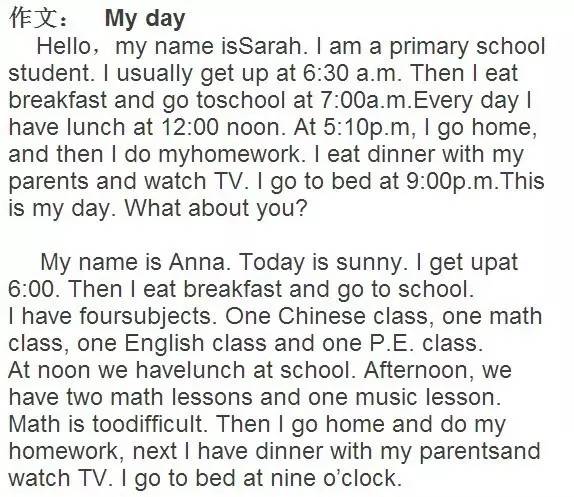
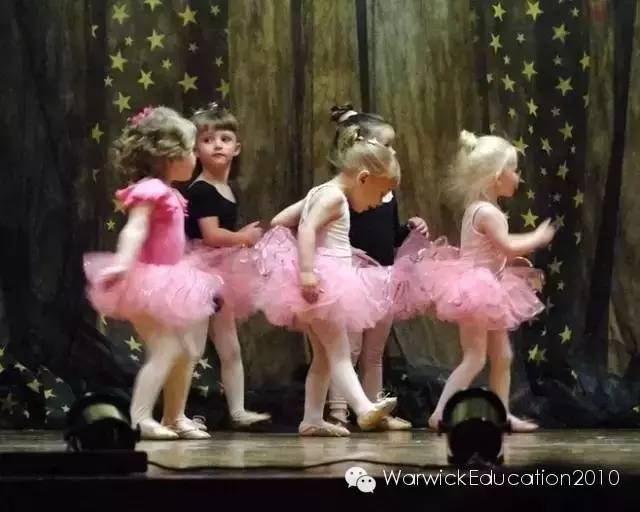
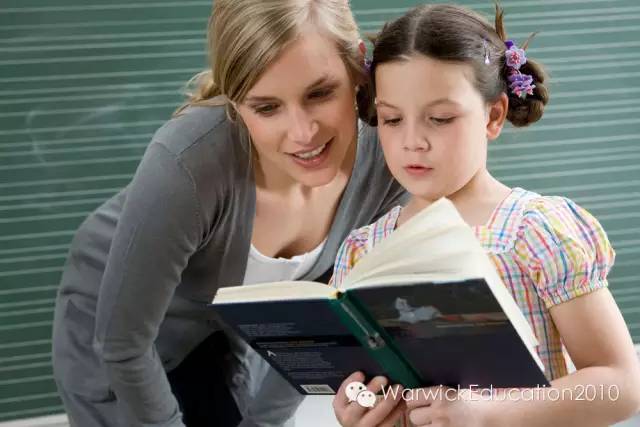
Unit Two My Favourite Season
基本词汇:
Season (季节) |
Month Festival (月份)(节日) |
Weather (天气) |
Activity (活动) |
spring |
March Tree-planting Day Women’s day April April Fool’s Day May Labor Day Mother’ s Day |
windy and warm |
plant trees |
summer |
June Children’s Day Dragon boat Festival Father’ s Day July Party building Day August Army Day |
sunny and hot |
swim |
fall (autumn) |
September Teachers’ Day Mid-autumn Festival October National Day Halloween November Thanksgiving Day Halloween |
windy and cool |
fly kites |
winter |
December Christmas Day January New Year’s Day February Spring Festival |
windy and cold |
skate make a snowman |
基本句型:
1. 询问喜欢哪个季节:
⑴--- Which season do you like best? 你最喜欢哪个季节?
---I like +季节+ best. (例:I likespring∕summer∕fall∕winter best)
---或:I like summer, because I can swim in the sea.
⑵--- Whatis your favourite season? 你最喜爱的季节是什么?
--- Spring∕summer∕fall∕winter is my favourite season.
2. 询问天气:
--- What is the weather like in fall inBeijing?北京秋天的天气是怎么样的?
--- It is sunny and cool.
3. 询问理由:
--- Why do you like winter best?为什么你最喜欢冬天?
--- Because I can play with snow and make asnowman.
4. 询问想要做什么
--- What would you like to do?
--- I’d like to climb∕play sports…… ( I’d = I would )
5. 询问具体季节
--- What season is it in March in Beijing? 北京的三月份是什么季节?
--- It is spring.
6. 询问能做什么
--- What can I do there? 我在那里能做什么?
--- You can go to the Great Wall. 你可以去长城。
7. 询问接下来打算去哪里?(be going to一般将来时)
--- Where are you going on vacation? 假期你打算去哪里?
--- I am going toCanada . 我将要去加拿大。
8. Summer is fromJune to August. 六月至八月是夏天。
9. How do Ilook? 我看起来怎么样?
10. Send me apostcard. 寄明信片给我。
11. How did THAThappen? 那是怎么发生的!
12. Whenis the best time to go to Beijing? Fall. 什么时候最适合去北京?秋天。
知识延伸:
1. 特殊疑问句:
⑴which 引导的特殊疑问句,询问喜欢哪个季节:Which season do you like best?
⑵why 引导的特殊疑问句,询问喜欢某个季节的原因:Why do you like summer?
⑶when 引导的特殊疑问句,询问什么时候:When is the best time to go to Beijing?
2. 第三人称单数形式:say—says (说) ask—asks (问) come—comes (来)
3. 单复数:tree—trees (树) leaf—leaves (叶子)
4. 同义词:fall—autumn 秋天
5. 同义句:Which season do you like best? ----- What’s yourfavourite season?
6. snowy 下雪的cloudy多云的rainy下雨的
7. 相似短语:play with snow玩雪like to swim游泳( like+ to do)
play in the snow 在雪地玩likeswimming 游泳( like + doing)
句型转换:
1. 肯定句↔一般疑问句:⑴I like summer. ↔ Doyoulike summer?
肯定回答:Yes, I do. 否定回答:No, I don’t.
⑵It is sunny and hot. ↔ Is it sunny and hot?
肯定回答:Yes,it is. 否定回答:No, it isn’t.
⑶The sky isvery blue.↔ Is the sky very blue?
The leaves arecolourful. →Arethe leaves colourful?
2. 划线提问:
⑴I like summerbest. →Whichseason do you like best?
⑵Myfavourite season is winter. →What isyour favourite season?
⑶It is sunnyin May in Beijing. →What is the weather like in May in Beijing?
⑷I’d liketo swim. →What would you like to do?

全写与缩写:
I am = I’m |
you are = you’re |
who is = who’s |
do not = don’t |
can not = can’t |
I would = I’d |
let us = let’s |
does not = doesn’t |
动词原形→第三人称单数形式:
普通形式 |
直接在动词后+ s:如like→likes、ask→asks、play→plays 、come→comes |
|||
特殊形式 |
have →has |
do →does |
watch →watches |
Unit 3 My birthday
基本词汇:
month(月份)
winter |
spring |
summer |
fall(autumn) |
December(Dec.) |
March(Mar.) |
June (Jun.) |
September(Sept.) |
January(Jan.) |
April(Apr.) |
July(Jul.) |
October(Oct.) |
February(Feb.) |
May |
August(Aug.) |
November(Nov.) |
ps月份的另一种缩写形式为:仅仅大写前三个字母,如:JAN 一月、FEB二月 |
numbers(数字)
基数词 |
one |
two |
three |
four |
five |
序数词 |
first(1st) |
second(2nd) |
third(3rd) |
fourth(4th) |
fifth(5th) |
基数词 |
eight |
nine |
twelve |
twenty |
|
序数词 |
eighth(8th) |
ninth(9th) |
twelfth(12th) |
twentieth(20th) |
基本句型:
1. 询问生日的时间:
⑴---- Whenis your / his / her birthday? 你的/ 他的/ 她的生日在什么时候?
---- My / his / her birthday is inJune.在六月。
⑵---- Is your / his / her birthdayinJuly? 你的/ 他的/ 她的生日在七月吗?
---- Yes, it is. / No, it isn’t.
2. 询问日期:
---- What is the datetoday? / What date is it today? 今天几号?
---- It is June 1st. 今天六月一号。
区分:(问星期)---- What dayis it today? 今天星期几?
---- It is Sunday. 今天星期天。
3. 问节日:
---- When is the Teachers’ Day? 教师节是什么时候?
---- It is September 10th.
4.询问一个月里有多少人生日:
---- How many birthdaysarethere in January? 一月有多少人生日?
---- There are … .
5. 询问谁的生日在某月:
---- Who has a birthday in October? 谁的生日在十月?(同义句:Whose birthday is in Oct.?)
---- Me.我。
6. ---- What areyou doing,John?约翰,你在做什么?
---- I am making a birthday chart for ourfamily. 我正在做我们家的生日表。
7. ---- Does shehave a computer? 她有电脑吗?
---- No, she doesn’t. 不,她没有。
8. ---- Then shewon’t be able to see the card. 那她不可能看见这卡片。(won’t = will not)
句型转换:
⒈肯定句→一般疑问句:
①把be动词(am/is/are)调到句首:
第一、二人称:My birthday is in June. ↔ Is your birthday in June?
第三人称:John’s birthday is May 1st. ↔ Is John’sbirthday May 1st?
(这里主要讲的是生日,因此回答一律用it 来回答:Yes, itis. / No, itisn’t. )
②以助动词do的适当形式引导:
第一、二人称:Ihave a computer. ↔ Do you have a computer? (Yes, I do. / No, I don’t. )
第三人称:Shehas a computer. ↔ Doesshe havea computer? (Yes, she does. / No, she doesn’t.)
(当句子出现does的时候,句中的动词要使用动词的原形。)
⒉肯定句↔否定句:在be动词(am/is/are)后+ not:
His birthday is in Jan. ↔ His birthday isn’tin Jan. ( is not = isn’t )
⒊划线提问:
⑴My birthday is in Feb.. →Whenis your birthday?
⑵Amy’sbirthday is Apr. 9th. →Whosebirthday is Apr. 9th ?
⑶John’s birthday is in Oct.. →Whohasa birthday in Oct. ?
⑷There are five birthdays in Jan.. →Howmanybirthdays are there in Jan.?
⑸The Children’s Day is June 1st. →Whenis the Children’sDay?

Unit 4 What are you doing?
基本词汇:
动词原形(一般现在时)→动词的现在分词形式(现在进行时) |
|
cook dinner →cookingdinner |
listen to music →listeningto music |
draw pictures →drawingpictures |
wash the clothes →washingthe clothes |
do the dishes →doingthe dishes |
clean the room →cleaningthe room |
read a book →readinga book |
write a letter →writinga letter |
answer the phone →answeringthe phone |
write an e-mail →writingan e-mail |
do homework →doinghomework |

句型转换:
⒈肯定句→一般疑问句:把be动词(am/is/are)调到句首,第一、二人称互换:
第一、二人称:I’m drawing pictures. ↔ Are you drawing pictures?(Yes, I am. / No, I am not.)
第三人称:Amyis doing homework. ↔ Is Amy doinghomework? (Yes, sheis. / No, sheisn’t.)
【当第三人称是男性,回答时用he代替;是女性,则用she代替,若是复数则用they】
⒉肯定句→否定句:在be动词(am/is/are)后+ not :
I am doing my homework. →I am not doing my homework.
He is listening to music. →He isn’t listening to music. ( isn’t = is not )
⒊划线提问:
⑴I am drawing pictures.→Whatare you doing?
⑵Amy iswriting a letterin thestudy. →What is Amy doing in the study?
Amyis writing a letter in the study. →Whois Amy doing in the study?
Amy is writing a letterin the study.→Whereis Amy drawing pictures?

例:I amlistening to music. He is doinghomework. They are running.
【注意:凡是出现now、look、listen等词,该句的动词则需要用现在分词形式】

Unit5 Look at the monkeys
基本词汇:
动词原形→动词的现在分词形式(V-ing)→第三人称单数形式 |
|
fly →flying→flies飞 |
sleep →sleeping→sleeps睡觉 |
jump →jumping→jumps跳 |
climb →climbing→climbs往上爬 |
run →running→runs跑 |
fight →fighting→fights打架 |
swim →swimming→swims游泳 |
swing →swinging→swings荡秋千 |
walk →walking →walks走 |
drink →drinking→drinks喝 |
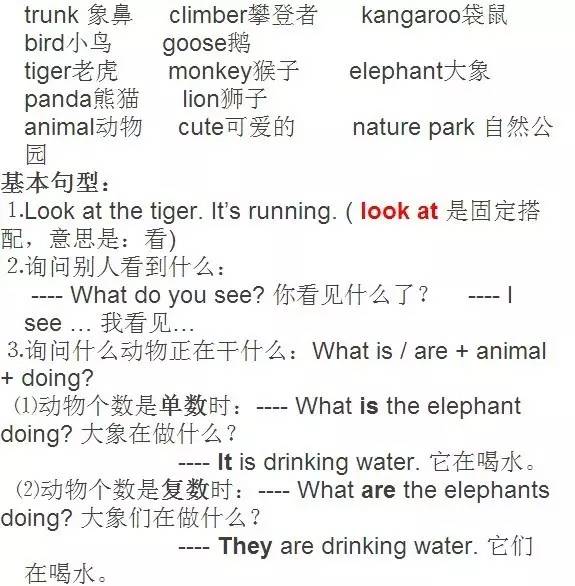
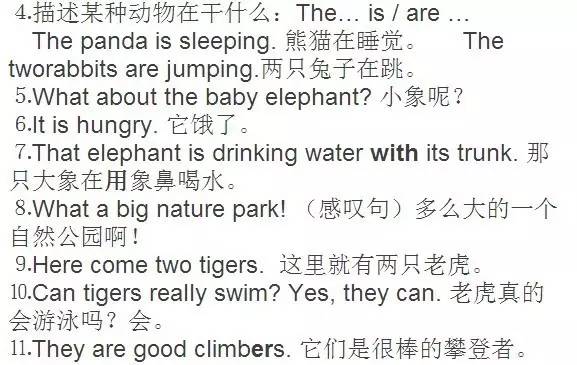
句型转换:
⒈肯定句→一般疑问句:把be动词(is/are)∕can调到句首,其他保持不变:
The tiger is running. →Is the tiger running? (Yes, it’s. / No, it isn’t. )
The pandas are sleeping. →Are the pandas sleeping? (Yes, they are. / No,they aren’t. )
The tiger can swim. →Can the tiger swim? (Yes, it can. / No, they can’t. )
⒉肯定句→否定句:在be动词(am/is/are)、情态动词can后+ not
The tiger is running. →The tigerisn’trunning. (isn’t = is not)
The pandas are sleeping. →The pandasaren’tsleeping. (aren’t = are not)
The tiger can swim. →The tiger can’tswim. (can’t = can not)
⒊划线提问:
⑴The tiger is running. →What is the tiger doing?
The tigers arerunning.→What arethe tigers doing?
⑵I see five birds. →What doyou see?
⑶I see five birds. →Howmanybirds do you see?
知识延伸:
⒈在英语中,当表示妈妈时,无论是人类的妈妈还是动物的妈妈,都可以用she来指代。
如:----What is the mother elephant doing? 大象妈妈正在干什么?
----She is walking. 她正在走。
⒉be动词的用法:
我是am你是(他们是∕她们是∕它们是)areit跟着他、她、它
单数is 复数are
Unit 6 Afield trip
基本词汇:
动词原形→动词的现在分词形式(V-ing) |
|
catch butterflies →catchingbutterflies |
have a picnic →havinga picnic |
pick up leaves →pickingup leaves |
count insects →countinginsects |
take photos →takingphotos |
write a report →writinga report |
watch insects →watchinginsects |
collect leaves →collectingleaves |
do an experiment →doingan experiment |
play chess →playingchess |
woods树林interesting有趣的vegetable蔬菜honey蜂蜜sweet food甜食
thing东西together一起tell告诉leave离开over there那里
基本句型:
⒈询问某人正在做什么:What + be动词+人物+V-ing.
---- What is Mike doing?
---- He is watching insects.
⒉询问某人是不是正在做某事:be动词+人物+V-ing?
---- Are they catching butterflies?
---- Yes, they are. / No, they aren’t.
⒊What do ants like to eat? They like sweet food. 蚂蚁喜欢吃什么?它们喜欢甜食。
⒋That is interesting. 太有趣了。
⒌Come and have a look at the ants. 过来看看这些蚂蚁。
⒍Do an experiment on me, please. 请用我来做实验。
⒎He is in the woods. 他在树林里。
⒏Tell him we’re leaving. 告诉他我们要离开了。
⒐She is running to us. 她正向我们跑来。
⒑She is over there. 她在那里。I am coming. 我来了。
知识延伸:
⒈表示用什么做实验时,要用on,如:Do an experiment on me, please.
⒉It is timeto后面接动词原形,如:It is time to have lunch. 到吃午餐的时间了。
Itis time for后面接名词,如:It is time for English class. 到英语课时间了。
⒊单复数:
butterfly—butterflies蝴蝶leaf—leaves叶子insect—insects昆虫
wood树木— woods树林ant—ants蚂蚁
★可数名词变复数的变化规则:
①一般在词尾加s,如:books、bags、fruits、girls、pens、
②以th结尾的名词,词尾+s,如:months、mouths、paths
③以s、x、z、ch、sh结尾的名词加es,如classes、boxes、peaches、fishes
④以辅音字母加y结尾的名词,变y为i再+es,如:family-families 、
baby-babi es
以元音字母加y结尾的名词直接在词尾+s,如:boy-boys、day-days、
toy-toys
⑤以辅音+o结尾的名词,词尾+es,如:tomato-tomatoes 、potato-potatoes
但某些却是+s,如:photo-photos、
以元音+o结尾的名词,词尾+s ,如:zoo-zoos、radio-radios、
kangaroo-kangaroos
⑥以f、fe结尾的名词变f、fe为ves,如:wolf- wolves、life-lives、knife-knives
★目前已学的不可数名词有:
bread面包rice米饭honey蜂蜜water水juice果汁meat肉
milk牛奶
本期责编:昍朤
临海教育
感谢大家的收听,我们明天再见!
----------临海教育,您身边的教育专家---------